I approached the blue metal gate separating our campus from the outside, and hesitated as the guard pushed down the handle and swung open the door. My eyes darted in every direction. Should I be doing this? Before coming to Tangier, my family and friends warned me to be cautious and always on alert. After all, Morocco is a Muslim country and news about radical Islam is always infiltrating the media. Even a sign posted on a campus bulletin board screamed “DO NOT GO WANDERING IN THE CITY ALONE! ALWAYS GO WITH A GROUP OF 3 OR MORE!”
With my hands gripping my backpack straps, probably a little too tightly, and my purse strategically slung across my body, I was as prepared as I was going to be. I had to do this. I had to push myself past what’s comfortable and easy—past what I have known all my life.
My first few strides were my most certain. I knew where I was going…well, at least the general direction. It was not long, though, before I grabbed my phone out of my purse, pulling up my trusty, offline Google map of Tangier. A blue pulsing dot indicated my location. I began typing in “Socco Alto,” which appeared as soon as I had entered the “Socco.” Only 0.9 miles away. That didn’t seem too bad. However, when I selected the route, it changed to 1.4 miles. I wasn’t sure where that extra half a mile came from, but I figured it was still within walking distance.
Although I was making my way up a street I had several times before, the ground felt a little more uneven beneath my feet and the stares from the Moroccans on the street seemed to hang longer than usual. Glancing down at the map, I noticed a more direct route than the way I was going, but I had never gone that way before. I weighed the shorter travel time against the high probability of getting lost and continued in the direction I was already going. Since it was the first time I’d left campus by myself, the last thing I wanted to do was complicate things. After all, I was in a new country, had just been in Tangier for a couple weeks, and I did not speak the native language.
Sticking to the more familiar but longer way, I came across a large group of Moroccans. Not particularly curious about what was going on, I just wondered how I was going to get across to the other side of the road. Drawing closer to the commotion, I noticed a smashed-in headlight and a front bumper hanging off a vehicle oddly angled on the side of the road. With widened eyes, I stared a little longer than I probably should have. As I continued to weave my way through the crowd, I couldn’t get my mind off the scene of the car accident. Despite all the crazy driving I have experienced and witnessed here in Morocco, I had not yet seen an accident—until then. Was this an omen? Should I beat a retreat back to campus?
I continued. Within about five minutes from the Socco Alto, one of Tangier’s new malls, Google Maps directed me to a narrow, unfamiliar road. With my destination in sight and mounting confidence, I took this path. The seemingly deserted passage was silent. I jumped back and let out a small gasp as the silence was broken by a gentle breeze rustling some leaves. My stride quickened while I rounded a bend that brought Socco Alto back in sight. As I passed parked cars, I fought off paranoid thoughts of someone jumping out and grabbing me. Cars turned too close and slowly for comfort. I picked up my pace until I made it to the front glass doors of the mall with a security guard standing just inside. I started to breathe normally again.
My first trip was unlike any solo trip I have taken to the malls back at home, but it was one that laid a foundation for all future adventures and experiences in Tangier. This journey was like putting a toe outside the box—outside my cocoon of safety.
After I returned to campus and told my mother about my adventure, I detected a note of panic in her voice. Since she worries about me all the time, after listening to her warnings, I decided that for her sake I’d no longer tell her about any future solo trips into the city.
A couple of days later, while I was navigating across the busy street with cars zooming past me in both directions, I decided against consulting Google Maps. I was determined to find my way without it. If I could walk to Socco Alto on my own, a quick jaunt to the Medina shouldn’t be that complicated. Although at times I had doubts about the direction I was going, I approached a familiar walkway and soon saw the white arch in the middle of the street. I knew I was close. My plan was to just sit on the edge of the waterless fountain in the middle of the square outside the Medina and observe my surroundings, seeing if anything struck me as interesting or unusual.
As I sat and my eyes wandered, I spotted a currency exchange shop. A group of us students were traveling to the Spanish town of Tarifa that Sunday, so I knew that I needed to exchange some dirhams, the currency of Morocco, into euros for the trip. However, I was out of luck. They did not have any euros. I continued into the Medina in search of another place. Just as I spotted one, I heard a “ni hao,” but I stared straight ahead, ignoring the corny attempt at drawing attention to my Asian features.
Within a minute or so, a Moroccan man of average height and a slight build approached and asked me where I was from.
“America,” I said simply and continued walking.
“My name is Saïd,” he said following me. “What’s yours?”
I hesitated, shook my head, and did not answer because I was unsure of his intentions. Undeterred, he asked again, and I shook my head once more. Saïd was persistent, showing me his business card and telling me to come to his family’s shop. He suggested that I follow him through the Medina to the store.
“No thank you,” I politely declined.
Saïd disappeared around a corner, and I entered the first currency shop I found. No euros again. Upon leaving, Saïd startled me by popping up again and pointed to a few shops down, telling me that it was the best currency exchange place in the Medina.
I entered this third shop, but still no euros. As I was leaving, Saïd invited me to his shop for the second time. I again declined. He was persistent and mentioned something about being able to help me exchange my money, and since I was in desperate by this point, I hesitantly followed him.
I grew more nervous with every step we took deeper into the Medina, and my mind replayed all the warnings I’d received about the perils of following strangers into their shops. I was alone with this stranger in an unfamiliar area. Yet I forged on. When we arrived at the store, no one was there other than the employees. I thought this was a bit odd, but I brushed off my concerns, assuming the lack of customers was because it was a slow time of day. They invited me to look around. The store was one of the larger shops I’d visited in the Medina. It had several rooms with an eclectic mix of merchandise and an upstairs. Although I didn’t buy anything, I spent some time admiring the rugs and ceramics.
Shortly after I began to look around, Saïd asked me how many euros I wanted. A hundred, I told him. “No problem,” he said. “I can get them for you.” I just had to give him my dollars first. My first thought was No way. I’m coming with you and I’m keeping my money with me. But he explained that Moroccans get a special price when exchanging money, and he has a friend with a shop. His patchy English made it hard to follow exactly what he said. Was his point that if I went along, his friend wouldn’t exchange my money? Or was it that the friend wouldn’t give me a good exchange rate? I hadn’t a clue. Saïd and another employee, likely a family member, assured me that they were trustworthy and that I could stay there with them while he exchanged it. I raised my eyebrows and held my purse a little bit closer before handing the equivalent of over 130 dollars in dirhams. It was possible I would never see that money again. My mind was racing in all directions.
But there was something about Saïd that I trusted, something about the way he stood, his eyes, the way he talked to me.
After he took off with my cash, one of the employees took me upstairs and tried to sell me a tablecloth, but I declined. I asked if they have any blankets. He showed me some similar to the colored ones I like that we have on our beds in the dorms. The “small” blankets were 400 dirhams. “Student price,” the man said. How many times had I heard that line? I found a purple one that I liked, but it wasn’t exactly what I was looking for. If I was going to buy a blanket, I wanted to really like it. I took pictures in hopes of getting second opinions upon my return to school. I also asked for a business card and said that I would probably be back.
“Come sit down. Would you like some tea?” one of the employees offered as we waited for Saïd. I shook my head while thinking how odd it was to be offered tea in a shop—I was not yet familiar with the Moroccan custom of serving tea just about anywhere. I did not have too much time to ponder this because Saïd soon returned with the cash. Exactly 100 euros. I felt a smile spread across my face as he handed me the money and led me back to the place where we first met. We shook hands and I said goodbye.
Was I too trusting by breaking the cardinal rule against going out alone and following strangers into shops? Perhaps. Or maybe I was too suspicious. After all, I did get the euros I needed, and I met a wonderful Moroccan family. Ultimately, I chalked up the experience that day to another building block in self-confidence—a full step out of the box of security.
The next day, while some people made a trip to the Medina, I wanted to do something different. I wanted to go to the beach—Plage Municipale—on the Mediterranean coast. Google Maps identified the shortest route by foot. I opted for the longer yet more scenic route via Avenue Pasteur. That way I could look out at Spain on my way.
The humid air was dense under the overcast skies. Walking along in my blue UNE Morocco T-shirt, rolled up jeans, and running shoes, I noticed locals wearing hats and thick winter coats, even though it was a warm day. Walking past a slew of ATMs, I heard English and, sure enough, a group of UNE students was trying to take out some money to exchange it for euros. They warned me that I should not be out on my own. I nodded but ignored their admonition; with two successes under my belt, I was determined to continue my journey.
At the Lazy Wall on Rue Pasteur, I took a short break and sat on the cool stone facing the Mediterranean. The sun illuminated the tops of the low-lying clouds hovering not far from the sea. I was lost in thought until a street cleaner came along with his oversized vacuum and sucked up the cigarette butts lying between the cracks not far from where I was sitting. Finally ambling down to the water, I saw the beach from across the street.
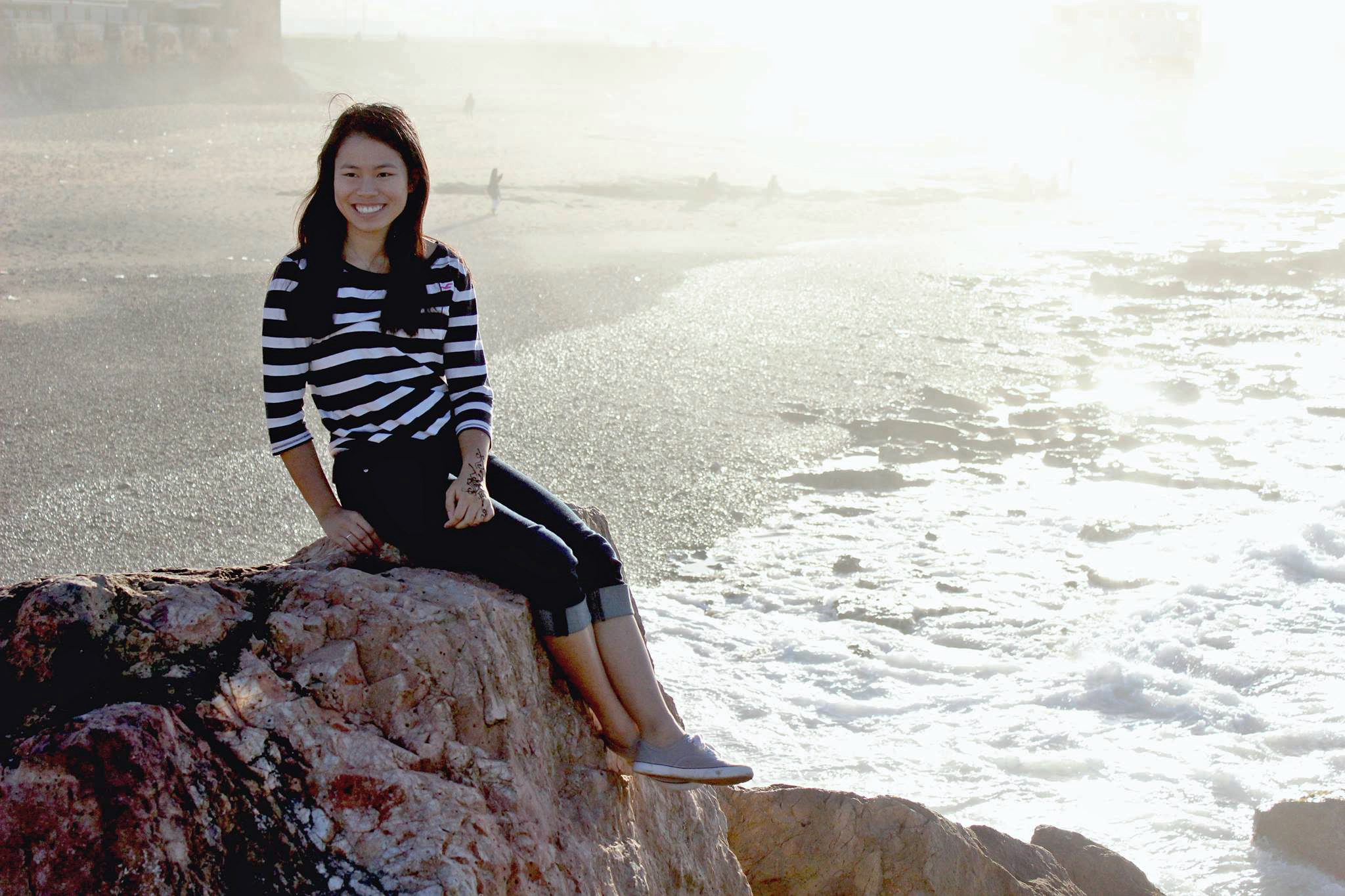
Unlike the beaches I have visited back at home in Maine, this one had scrawny trees sprouting from the ground as well as benches secured in the sand. Sitting on a gray, cold stone bench, I watched Moroccan couples and friends conversing and laughing. A pug, in an orange harness and with its ears bobbing up and down and its tongue wagging, followed its owner. As I brushed my hand on the ground, the grains of sand were fine yet felt slightly rough between my fingers. Trash littered the sands and the din of a cement mixer from a construction site echoed in the background.
Moving on to the beach, I spotted two camels lying in the sand next to their owners. Seagulls soared overhead and a gentle breeze broke the weight of humidity in the air. Scanning around, I also noticed a few kids playing soccer close to the water, couples sitting together looking out over the horizon, and a man in a tattered blue suit waving a metal detector in search of loose change.
As I approached an unoccupied part of the beach, the chatter died down and I began to hear the light crashing of the waves. Rocks, shells, and a few sea creatures were embedded in the sand. I picked through them, just as I’ve done in the past with my best friends back home. It brought me back times during my childhood, sifting through the sand to find the most beautiful, the most unique keepsakes. After collecting a few, I cleaned them in a shallow pool of water, careful not to soak my sneakers with the incoming waves. Just as I began to rise, a parade of thumps galloped in a large circle around the beach. A man riding a horse raced around me like a figurine in a carousel.
With my shells safely tucked away in my purse, I got up and approached the walkway that runs along the beach where I emptied the sand from my shoes the best I could. I then sat down on a bench to figure out how to get back to campus. I had ventured quite a ways down the beach, so I decided to return using a new route.
On the way back, many more people than normal tried to talk to me. This time, I was not fazed and did not recoil in fear. Although I got honked at and came within inches of getting run over by a taxi, I continued on my way with a sense of elation until I caught sight of the landmark mosque. It was then that Google Maps indicated a shortcut. I trusted the map, and sure enough after five minutes, I spotted the back wall of the American school and followed it around to the entrance of campus. “Now that wasn’t so bad after all,” I thought.
Through my adventures, I was beginning to see Tangier for what it truly is—the “Interzone” to use one writer’s expression, a hub of diversity. It maintains its ancient soul in the Medina and Kasbah but, over time, has grown into a modern metropolis with new malls and construction projects. Although a landmark such as Café Madame Porte has been replaced with an upscale McDonald’s, Tangier’s history remains strong through places such as the Café Hafa and Librairie des Colonnes. And then there are the people. They are not dangerous and filled with hatred against Americans like I had been told back home. They are simply people—just like me.
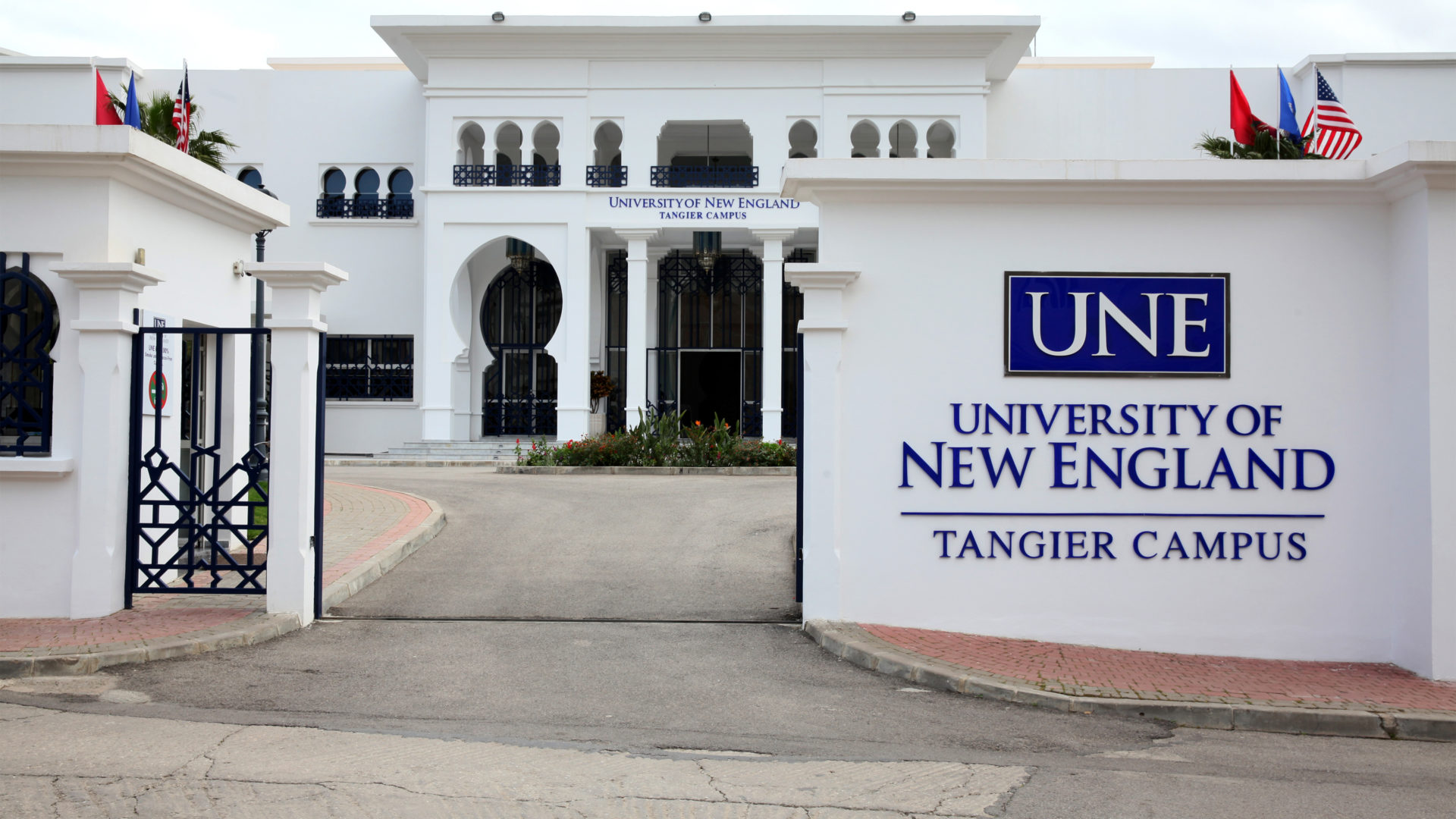
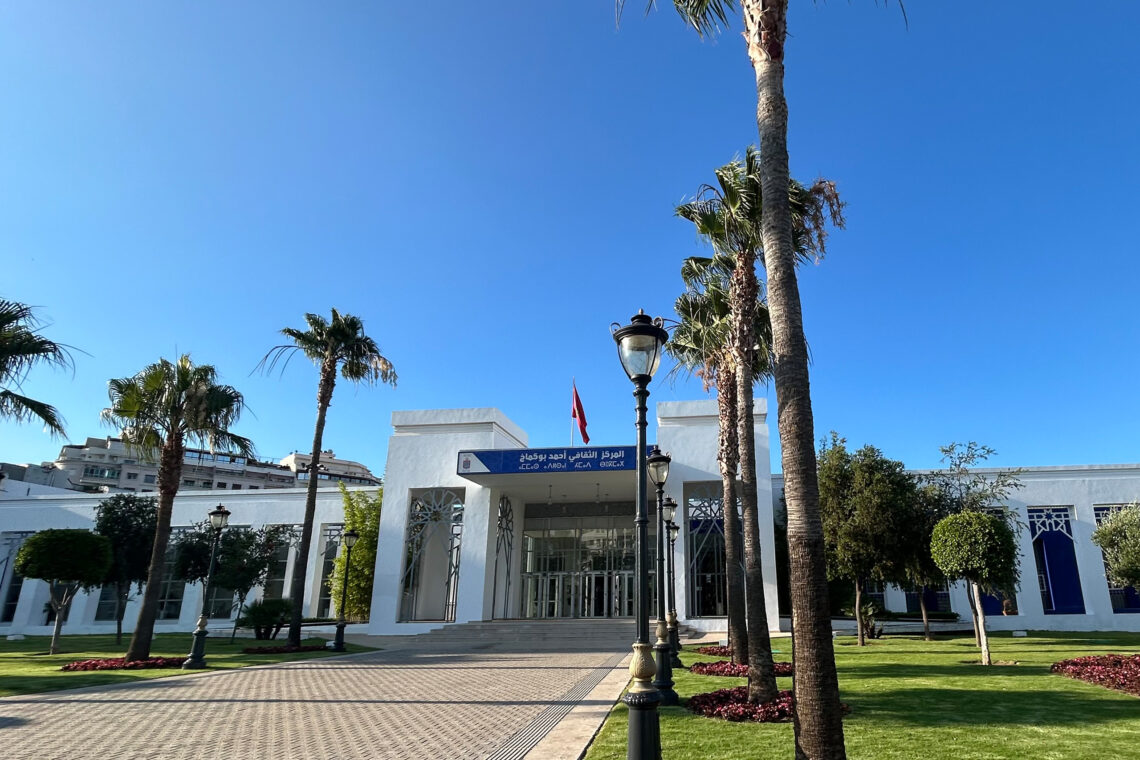
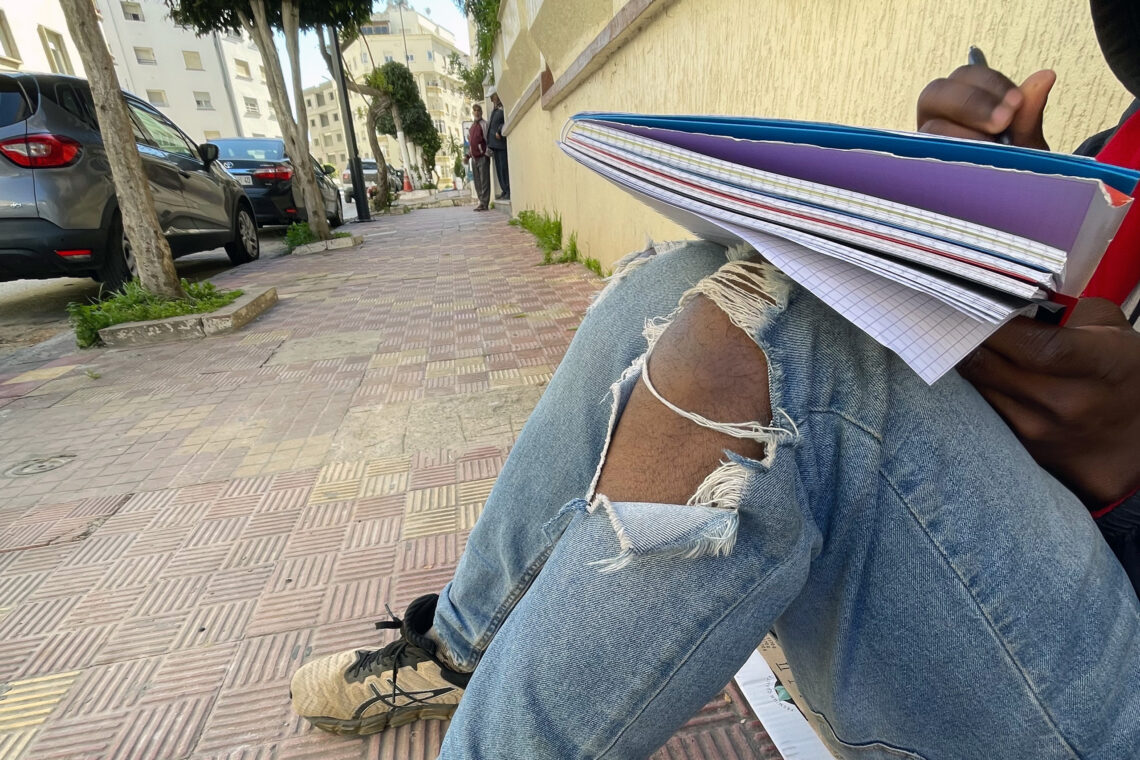
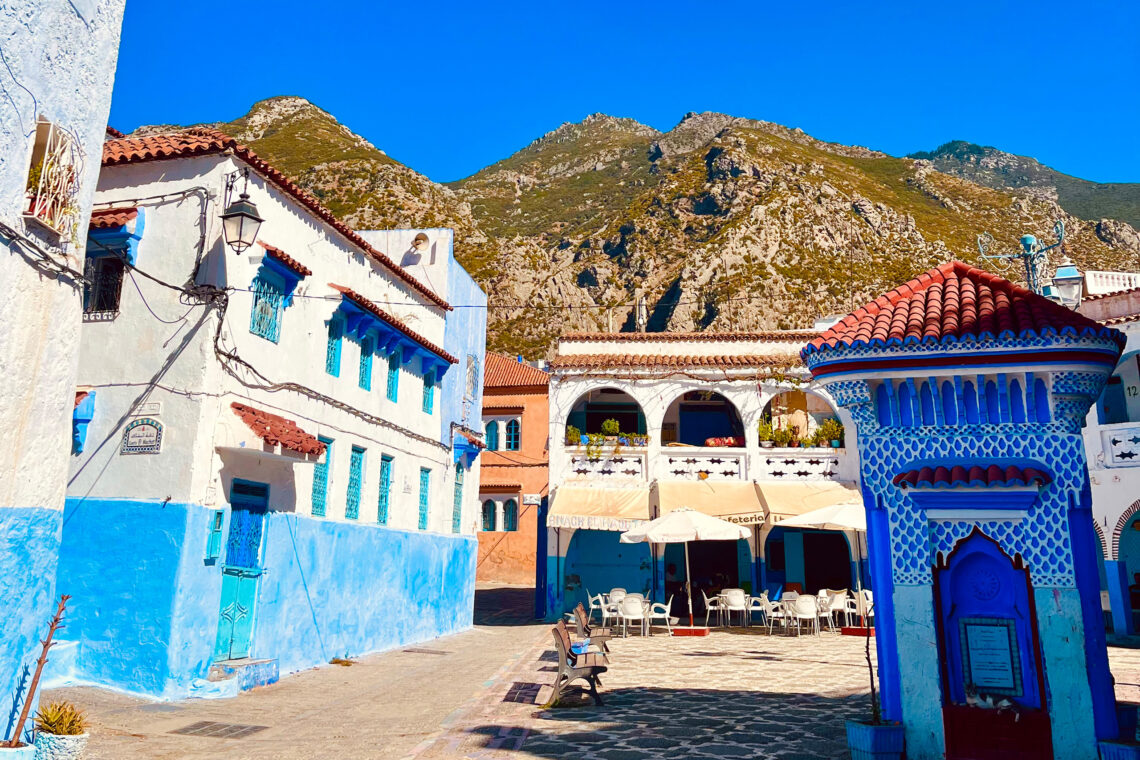
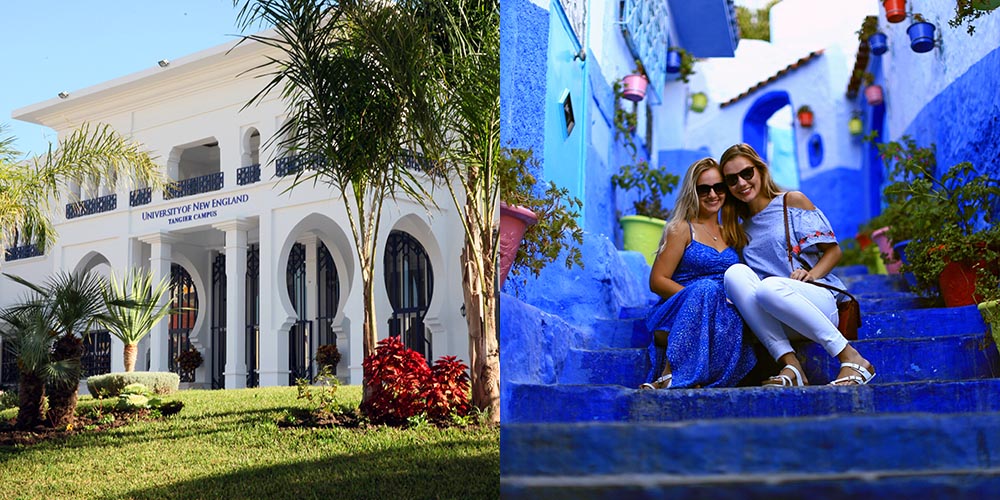

Comments are moderated by the editor and may not appear on this discussion until they have been reviewed and deemed appropriate for posting. All information collected is handled in a manner consistent with our privacy policy.